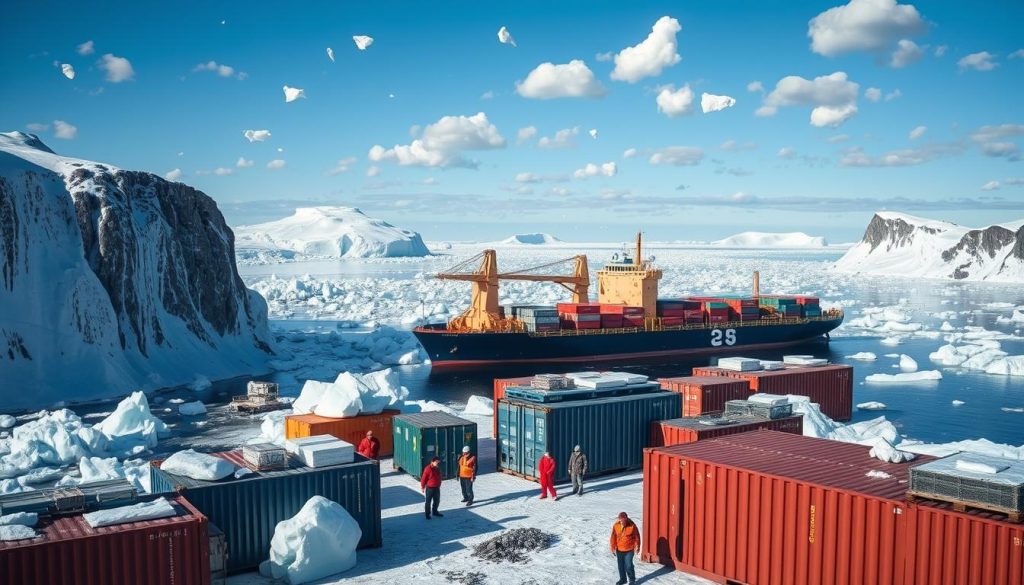Antarctica is becoming a key player in global trade, presenting exciting opportunities for importing and exporting. This unique continent is valued for its incredible natural resources and strategic business importance. Beyond resource extraction, the Antarctic trade involves international teamwork and following environmental rules. It’s complex but offers great rewards for those willing to navigate it.
Introduction to Antarctica’s Trade Potential
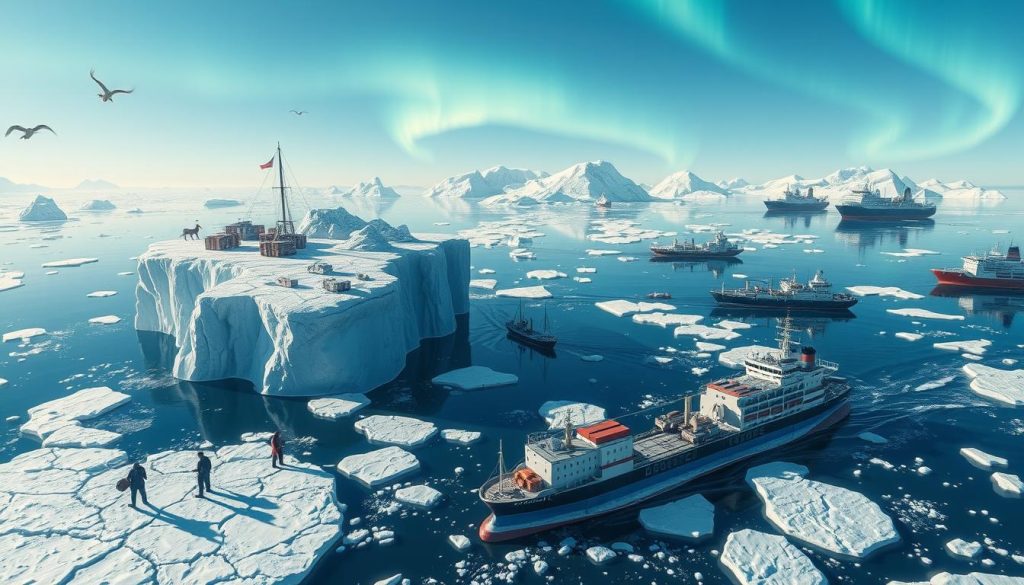
Antarctica offers a world of untapped trade potential. It promises much for the global economy. Its unique geography and rich resources open many business opportunities. Businesses looking to grow are eyeing Antarctica because of its sustainable resources and scientific possibilities.
The interest in Antarctic trade is rising. This is as industries see the benefits of this untouched environment. As exploring these resources becomes a possibility, the trading landscape is changing.
Trends are showing a move towards using polar resources. This highlights the untapped opportunities in Antarctica. By entering this market, businesses can embrace environmental care and manage resources responsibly.
Geographical Significance of Antarctica
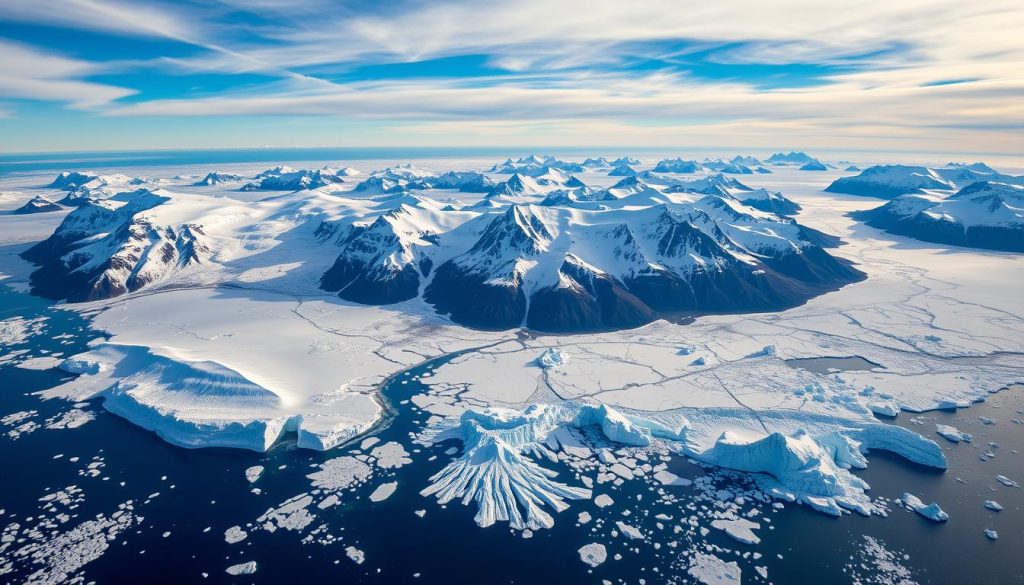
Antarctica has a big role in world trade because of its geography. This huge, ice-covered place has special features. These features affect its natural resources and how goods move. The continent’s diverse ecosystems host many forms of life. This makes Antarctica important for science and possibly business.
Antarctica is surrounded by the Southern Ocean. This position provides key sea paths that link continents. These sea paths help in moving goods around the world. This adds to Antarctica’s importance in global trade talks. Though far from other lands, it inspires new ways to solve transport challenges.
The extreme weather and isolation affect how trade and transport work here. Understanding these effects is crucial. It helps us see new chances and the challenges of doing business in such a unique place.
Import and Export Business Opportunities in Antarctica
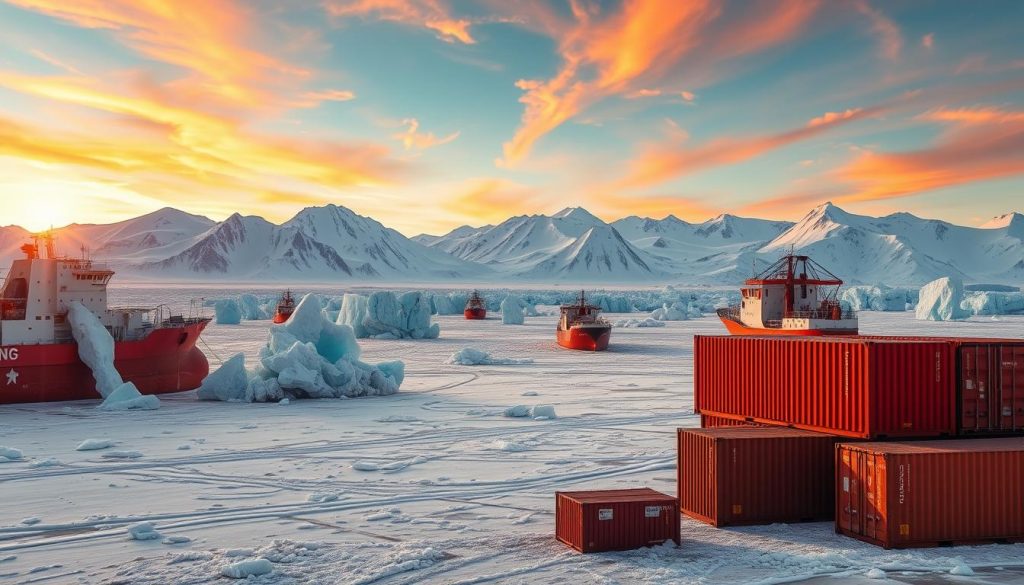
Antarctica is a rich place for business due to its special location and environment. It has resources to export and many needs to import. This creates a special market worth looking into.
Unique Resources for Export
Antarctica’s exports are highly valuable. This includes:
- Krill, important for food products and fish farming.
- Minerals, supporting worldwide energy needs.
- Research findings, boosting innovation in areas like climate and material science.
These resources make Antarctica key to local and global markets.
Potential Import Needs
To keep research stations running, Antarctica has big import needs. Key imports are:
- Food to support those living in tough conditions.
- High-tech gear for research and logistics.
- Special gear for safety and performance in harsh weather.
These needs show how Antarctica relies on imports to support its unique environment and work.
Current Regulations and Trade Laws
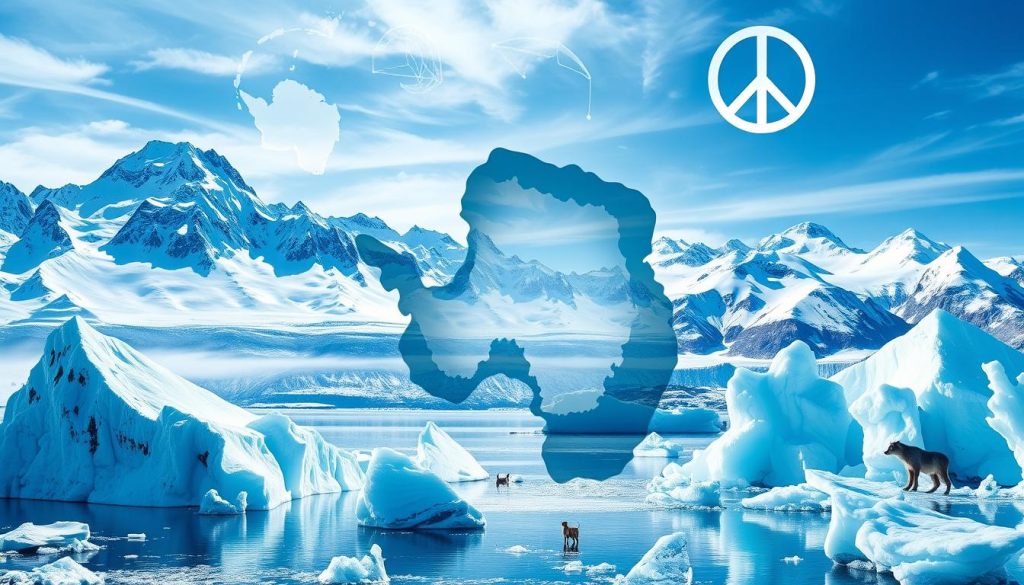
Antarctic trade laws are shaped by a set of treaties. These treaties aim to keep the continent for peace and science. They stop mineral mining and other harmful activities. The Antarctic Treaty System includes the main treaty and its agreements.
These trade rules protect Antarctica’s unique nature. They set high standards to make sure commercial activities don’t harm the area. The rules allow trade that looks after the environment.
Science cooperation is key under these treaties. It promotes working together on research between countries. This teamwork leads to international scientific projects. But, it all must follow strict environmental laws. Trading in Antarctica means dealing with these laws to balance economy and nature.
Market Analysis of Antarctic Resources
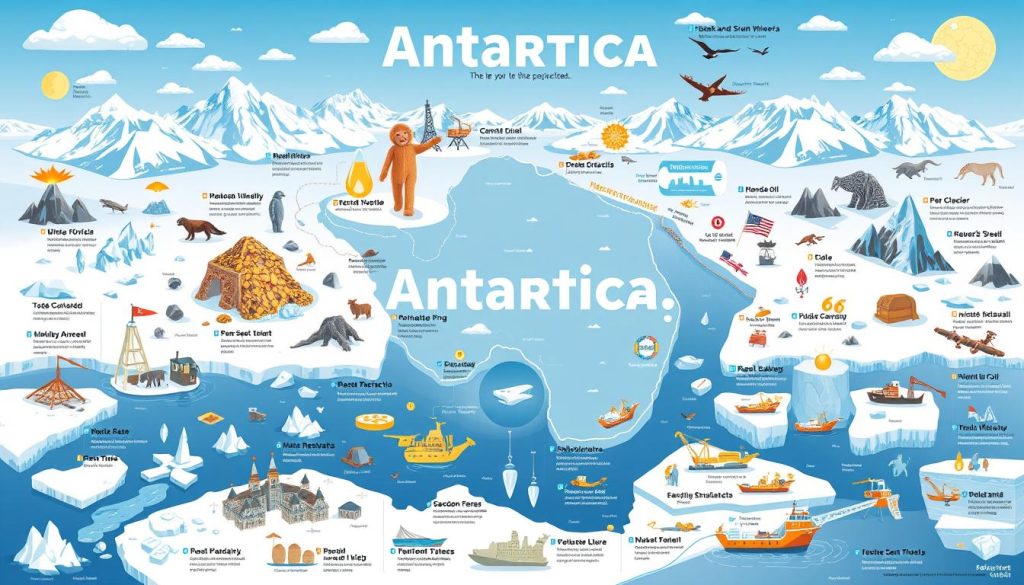
The Antarctic offers a unique chance for market study. We focus on natural resources and the value of scientific work. The goal is to understand these assets in the context of a world needing sustainable options.
Natural Resources
Antarctica’s wealth in natural resources draws attention to future market possibilities. It boasts:
- Marine life, with commercially valuable fish species
- Promising mineral reserves that could satisfy global needs
- Freshwater from melting glaciers, crucial for the global water crisis
The market trends for Antarctic resources are swayed by climate change. It makes a detailed evaluation of these resources critical. Both scientists and companies must watch the ecological effects when thinking about using these resources.
Scientific Research Contributions
Science in Antarctica goes beyond academic gain; it holds commercial promise too. The surge in climate research interest leads to investment in Antarctic studies. This investment brings insights for environmental aims. Key points include:
- Global scientific cooperation, boosting research credibility
- Data gathering that aids in climate prediction and nature conservation
- Research in Antarctica driving eco-friendly innovations
Linking scientific work to market studies shows a road for eco-focused businesses. As the world calls for more sustainable methods, the scientific efforts in Antarctica become increasingly important.
Key Players in Antarctic Trade
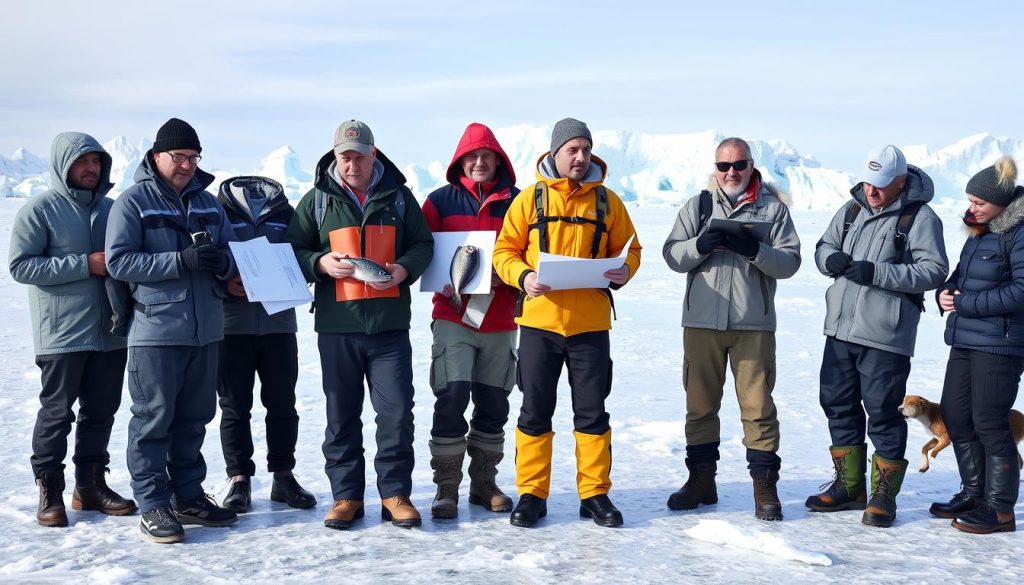
Exploring Antarctic trade means looking at its major participants. Mainly, these are government agencies, research bodies, and businesses. Each plays a vital role in shaping trade rules and practices.
Government agencies set and enforce policies in the area. They work together to stick to international agreements. This helps protect the environment while supporting fair trade. Trade groups help by promoting high standards and speaking for their members globally.
Research organisations are key to the Antarctic economy. They provide important scientific insights that guide trade choices. Their work determines sustainable resource use and its effects on the ecosystem.
Businesses add creativity and funding, leading in exploring new trade chances. Their work with regulations and research helps balance resource use in Antarctica.
This teamwork creates a strong trade network. It gives a strategic edge in dealing with the challenges of business in such a unique and untouched place.
Trade Routes and Logistics Challenges
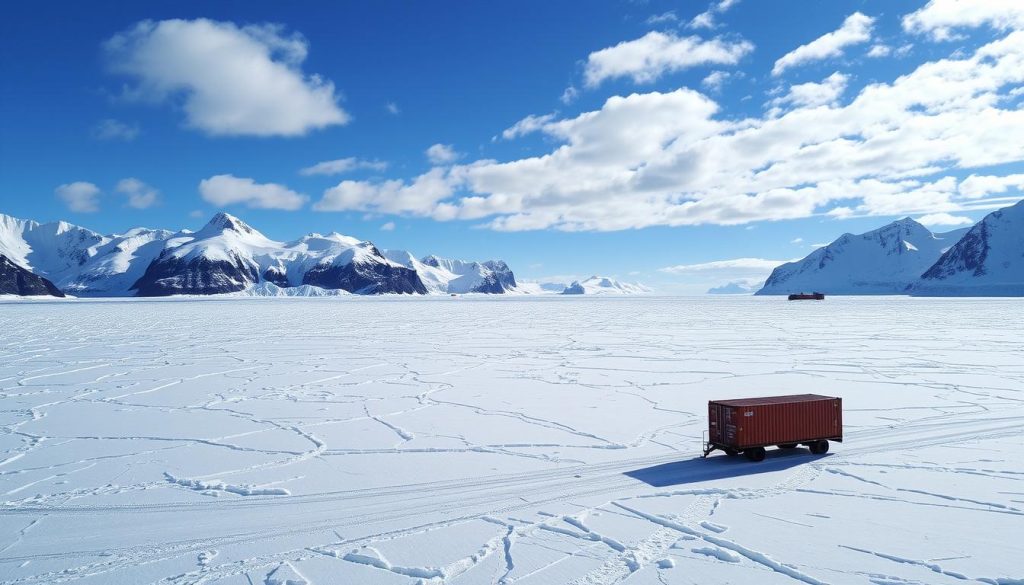
Setting up trade routes to and from Antarctica comes with challenges. The lack of roads and ports makes getting goods in and out tough. For smooth trade in this far-off place, we must find new ways to move things. Knowing how and when you can transport items is key for businesses looking to trade here.
Transportation Infrastructure
Getting around in Antarctica means using ships and planes mostly. The freezing weather and ice make sea travel difficult. We use:
- Ice-strengthened ships for carrying goods in summer.
- Planes for quick deliveries, even though landing spots are few.
- Special vehicles for moving over ice.
Each transport method has its own big challenges. To deliver things efficiently and keep costs down, investing in the right ships and planes is vital.
Seasonal Variations in Trade
Trade in Antarctica is heavily affected by the seasons. Trading is busiest in summer when the ice melts enough for ships to pass. We must think about:
- The long winter nights that stop operations.
- The rush for supplies when there’s only a short time to move them.
- Weather that can change plans, meaning we need to be ready to adapt.
Doing well in this tricky trade means understanding Antarctica’s weather well. This lets businesses plan better logistics and build steady trade routes.
Environmental Considerations in Trade
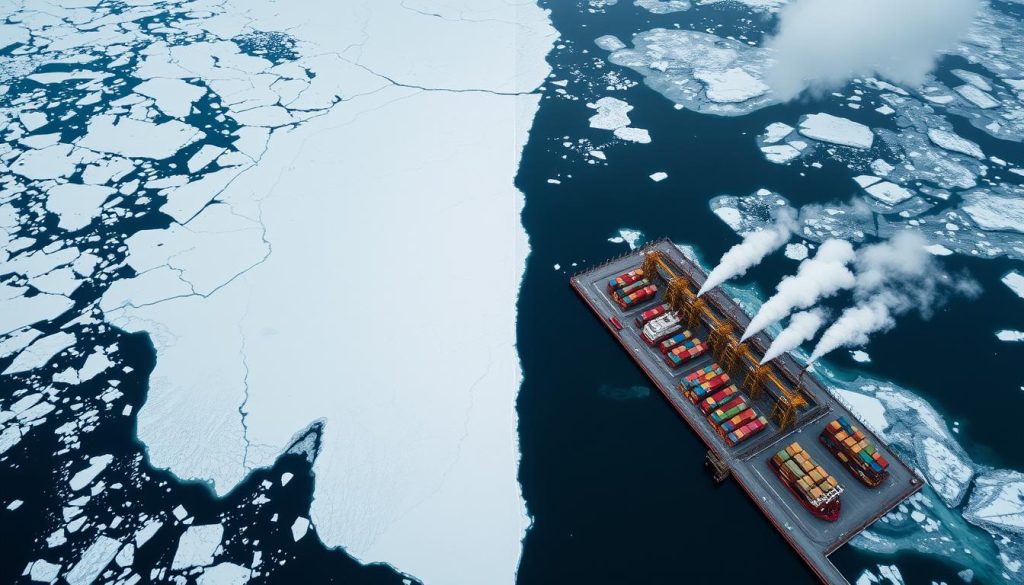
Trade in Antarctica must think about the environment. Its ecosystem is fragile and needs looking after. This means we should only trade in ways that don’t harm Antarctica’s nature.
For trade to work, we need rules that protect the Antarctic environment. This involves:
- Using ships that don’t pollute much
- Keeping an eye on how we take resources, to avoid destroying habitats
- Having strict rules to handle waste properly
Studying Antarctica’s ecosystems is key. Research helps us see trade’s effects over time. By understanding this, we can trade without hurting the environment. This protects Antarctica’s stunning wildlife and ensures we can use its resources in the future.
Investment Opportunities in Antarctic Ventures
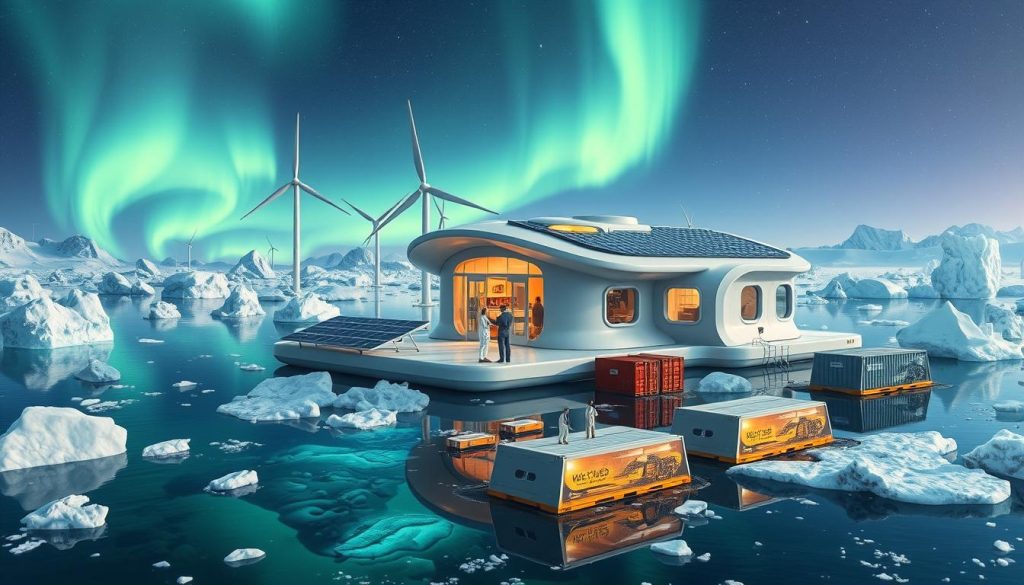
Investing in Antarctic ventures opens up exciting options. Sectors like tourism, sustainable fishing, and scientific research are becoming popular. These areas offer unique Antarctic investment opportunities that grab global investors’ interest.
Antarctic tourism, with its stunning scenes and wildlife, is getting more popular. Investors can cash in by funding eco-friendly places to stay and tours. This helps protect the untouched environment.
Sustainable fishing is a promising investment area. With the right management, investing in this sector can be profitable. It helps protect the sea life too.
Scientific research in Antarctica now needs outside money. Backing these projects can lead to major breakthroughs. This includes understanding climate change and saving the region. Investors into sustainable research will find these Antarctic investment opportunities very rewarding.
With more demand for responsible actions, investing in Antarctica is expected to do well. Those who dive into this field can make a big difference. They will also enjoy financial benefits.
Technological Advances in Antarctic Trade
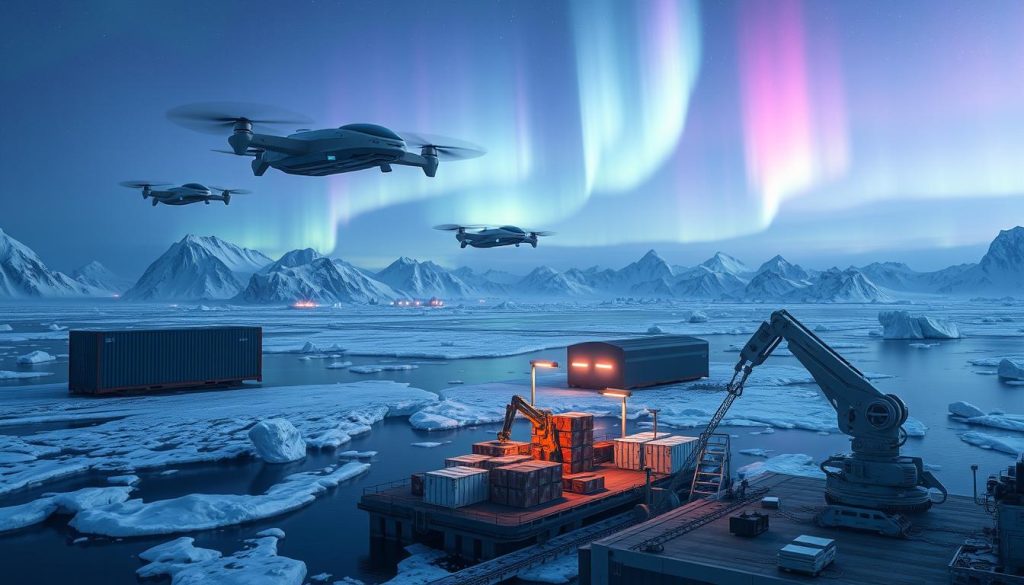
Technology’s growth in Antarctic trade boosts both efficiency and sustainability. Cold chain logistics and remote monitoring are changing Antarctic trade. These innovations help tackle this tough area.
Innovations in Cold Chain Logistics
Cold chain logistics is vital for keeping perishable goods from Antarctica fresh. Advanced refrigeration and temperature-controlled containers keep products at the right temperatures. These tech advancements allow for real-time tracking and quick reactions to temperature changes, protecting product quality.
Remote Monitoring Systems
Monitoring tech improves management and research in the Antarctic. By using satellite and IoT devices, remote systems collect valuable data. They track environmental conditions, the supply chain, and how well equipment works, aiding efficient and safe Antarctic operations.
Economic Impact of Trade in Antarctica
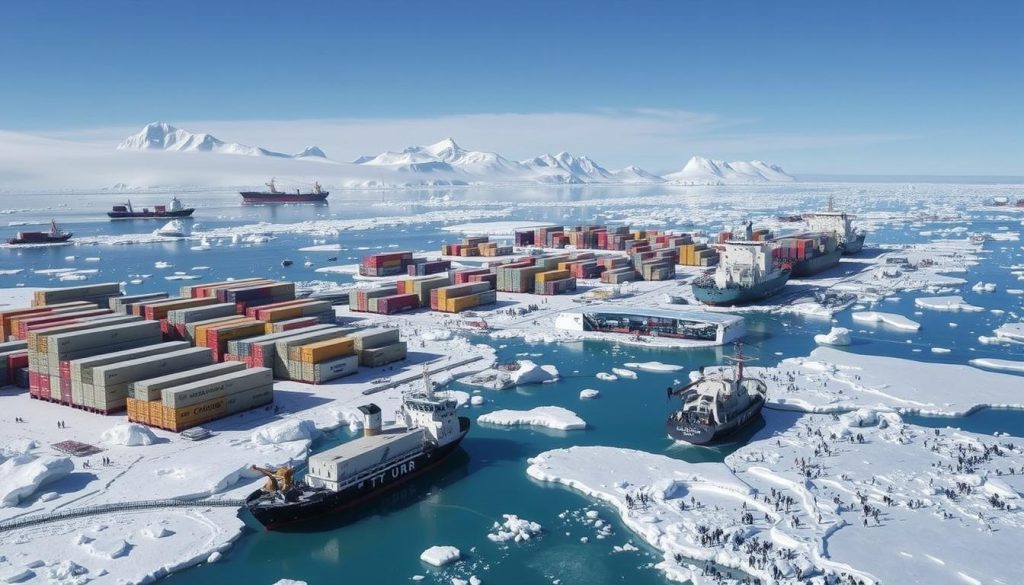
The economic impacts of trade in Antarctica go well beyond simple profits from mining and fishing. These activities boost local economies and help other related industries grow. For example, focusing on eco-friendly methods opens up new jobs and supports innovation.
The economy in Antarctica benefits in many ways, such as better infrastructure and global partnerships. Upgrades in transport make the supply chain smoother, which aids trade. This, in turn, fosters tech and science progress across countries.
Trade also encourages nations to work together on scientific studies, leading to new discoveries. This collaboration builds stronger international ties, attracting more investments and making the region more stable. This shows how trade not only grows the economy but also promotes worldwide cooperation.
Challenges Facing Import and Export Businesses
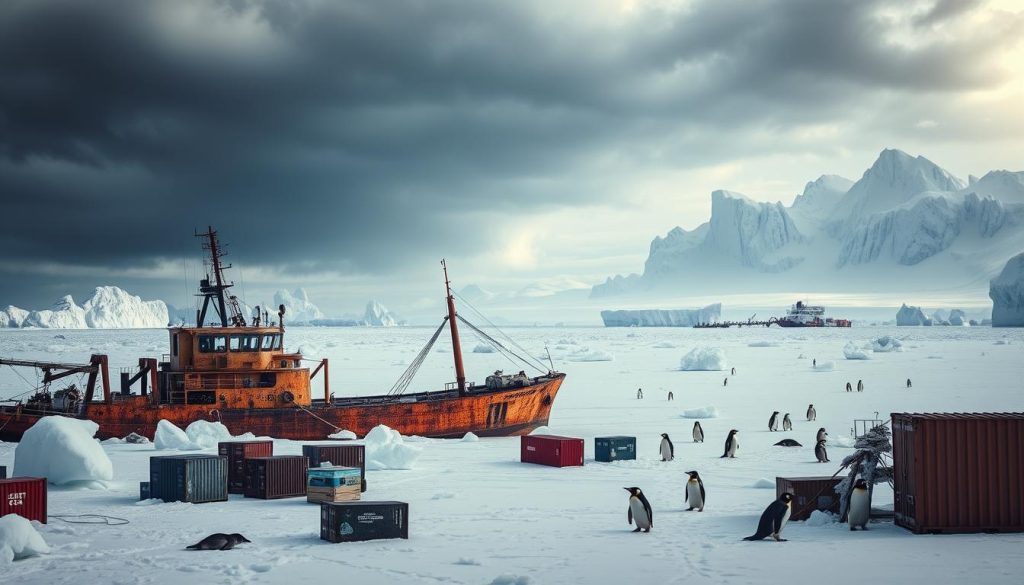
Businesses entering Antarctic trade face huge challenges. These include unpredictable weather and complex international relations. It’s vital to handle climate issues and work together globally. This helps overcome the tricky parts of trading in such a unique place.
Weather and Climate Factors
The weather in Antarctica is tough and changeable, making trade hard. Main problems are:
- Severe storms that mess up shipping times
- Extreme cold that affects how goods are stored and moved
- Melting ice that makes some routes impossible to use
This unpredictable climate can make things cost more and take longer. Businesses need strong plans to deal with these weather challenges.
International Relations and Cooperation
Trading in Antarctica is heavily influenced by international relations. Good global teamwork is needed for:
- Sharing resources and tech for eco-friendly methods
- Working together to protect the environment
- Creating policies that all countries will follow
As diplomatic situations change, new obstacles can arise in Antarctic trade. Companies have to be flexible and work well with others. This is crucial for success.
Future Prospects for Antarctica’s Trade
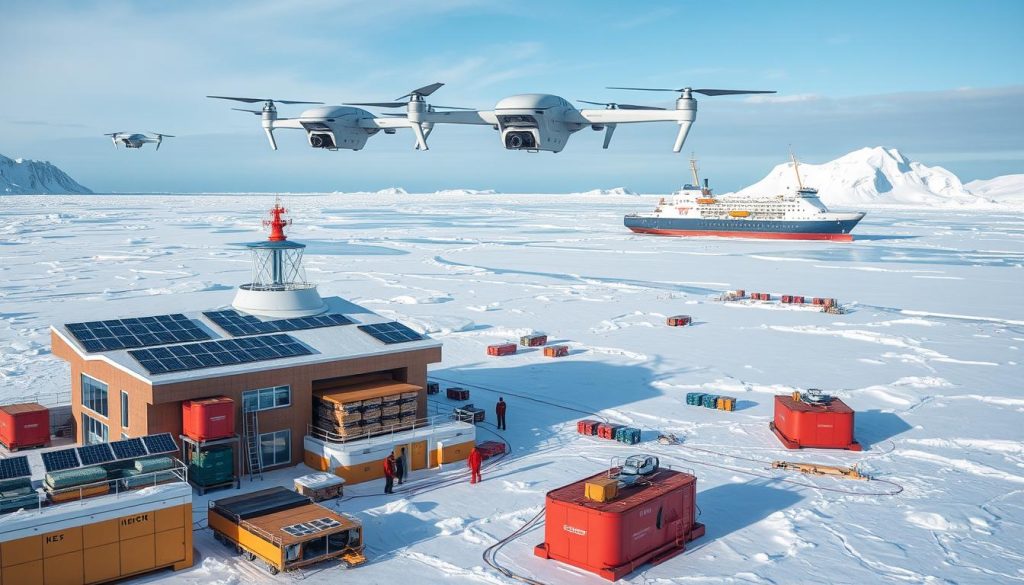
The future of Antarctic trade looks promising for growth and development. With increasing global interest in the region, new opportunities are emerging. Economies around the world see the value in Antarctic resources, especially considering climate change and shifting political dynamics.
Several factors will help trade in Antarctica grow. Climate change might change ice patterns, leading to new shipping paths and easier access to new areas. These changes could draw investments in tourism and resource gathering.
- Advent of new technology and logistics solutions streamlining operations.
- Increase in scientific research prompting demand for equipment and supplies.
- Potential for sustainable practices to enhance the appeal of Antarctic resources.
Countries are looking at their strategic interests in Antarctica. Working together with international groups will be key in determining trade’s future there. This global teamwork could lead to better strategies for using resources sustainably, making sure environmental issues are always considered in trade plans.
Case Studies: Successful Antarctic Trade Initiatives
In recent years, many Antarctic trade case studies have come to light. They show how different organisations succeed in this special market. One key to success is focusing on sustainable fishing. Firms follow strict rules set by the Convention on the Conservation of Antarctic Marine Living Resources (CCAMLR).
This approach shows you can do well in business while keeping nature safe. Another key example involves using scientific research for business growth. The British Antarctic Survey and companies have teamed up. They use new scientific discoveries to improve things like tourism and resource management. This helps them make more money.
These stories tell us that success in Antarctic trade needs a few things. You need to follow rules, use new ideas, and work together. For newcomers, these success stories are very helpful. They offer lessons on how to approach Antarctic trade. Looking at these examples helps new businesses understand the market better. It prepares them for success in the future.

